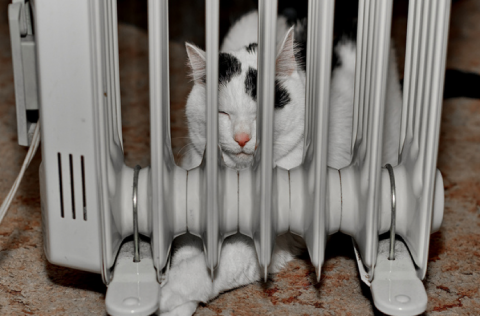
If it's zero degrees outside today and it's supposed to be twice as cold tomorrow, how cold is it going to be? As we start to experience the chills of a Catskills winter, questions like that (except maybe a little less tongue in cheek) become more and more common.
With the cold in the air, many turn to space heaters to keep their homes a little more livable. These types of heat-generating devices are efficient in taking the chilly edge out of an otherwise unoccupied area, and at times they may seem more economical than conventional means of heating even regularly occupied spaces. But they pose many additional risks if not used correctly. More times than not, the risks of using a space heater outweigh the benefits.
First, we know (or at least should know) that any heating appliance is generally hot. The U.S. Consumer Product Safety Commission estimates that more than 25,000 residential fires every year are associated with the use of space heaters, causing more than 300 deaths. An estimated 6,000 persons receive hospital emergency room care for burn injuries caued by contact with the surfaces of space heaters.
This applies to widely used and commercially available electric radiators, electric heater fans, propane and LPG heaters, kerosene heaters, and any other self-contained appliance that uses convection or radiation to serve as a source of heat. Many individuals, particularly children, sustain burns from these appliances when they are within their reach, so as a general rule, place any space heater WELL out of the reach of children and injury-prone adults.
We also know that any space heater utilizes some sort of electricity or fuel -- some more than others -- and are not designed to replace conventional means of heating a house, but rather to supplement existing conventional systems. Some may not be used in an enclosed area at all.
Space heaters can be classified as "vented," "unvented," or "vent-free." One would think that an unvented heater does not need a vent, right? Wrong. "Vented" heaters are generally located permanently next to an outside wall and vent harmful gases of combustion through it. "Unvented" heaters mostly involve liquid-fueled space heaters not recommended for indoor use, and "vent-free" heaters provide no risk of off-gas.
To see the wonderful things that just one of these many fun gases can do to your body if your space heater isn't properly vented per manufacturer's recommendations, visit the July article of Stayin' Alive here. So when you install a space heater, make sure that it is done by a professional, and if it isn't designed to be inside, keep it out!
As with any high current electrical device, an electric oil-filled radiator or smaller element and/or fan space heater should be plugged directly into a wall receptacle. Never use an extension cord with one of these units as it could cause an electrical fire. Always inspect your electrical cord prior to use, turn off and unplug your appliance when not in use, check for a good snug plug-to-outlet fit, and make sure your wall outlet or cord does not heat to the point that it is painfully hot to prolonged touch -- this may be indicative of an electrical issue and MUST be addressed immediately.
Oh, and don't use them in water. Duh.
Fuel fired space heaters such as kerosene, LPG, or propane heaters are just as dangerous as electric heaters if not cared for correctly. Refueling these units poses a particular risk as they should be turned completely off and cooled before refueling.
Always use the fuel that the unit was designed for, because deviation from the specified fuel can cause the unit to heat more than designed and have a disastrous outcome. Fuel fired space heaters should be equipped with an automatic switch to shut the unit off if tips over, and they should never be moved while operating. Remember that propane, although cleaner than kerosene, still needs to be vented and is heavier than air. If you ever have a propane leak, go to an outside phone to call the fire department. Do not operate any electrical switches or the telephone if a leak has occurred, since a spark could cause an explosion.
Additional general rules of thumb for use of space heaters:
- Ensure that nothing is placed on top of the heaters and that the heaters are placed on a level, non-combustible surface at all times when operating.
- If a heater is dropped, make sure a professional inspects the unit for proper operation.
- Keep all space heaters at a minimum of three feet from any household combustibles.
- Unless you are present during operation, only use a space heater with a built-in thermostat that shuts the unit off at a specified temperature.
- Finally, check to see if the space heater you are considering is UL (Underwriters Laboratory) or FM (Factory Mutual) approved and labeled accordingly. This means that the units have passed stringent safety tests.
As long that you responsibly follow the rules for safe operation of space heaters, they can provide a nice, warm refuge for you to enjoy in the upcoming onslaught of Old Man Winter. As always, when in doubt, read the owner's manual. It could save your life!
Rich Muellerleile is the captain of the Shandaken Ambulance Service. He posts regular safety tips in his column, Stayin' Alive, on our Shandaken town page.
Photo of a cat next to a space heater by Flickr user Mark Tee.















